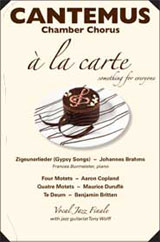Program Notes
Cantemus à la carte: Something for Everyone
April 30 & May 1, 2011
Which came first, the programming theme or the repertoire? Usually, it is the theme, but I must admit that this time it was the repertoire. Months ago, while preparing this program, I looked through and listened to choral works from different composers. And I knew that there was one work that we had to do, as I had already decided that the Brahms Opus 103 would be a good match for our singers. Brahms’s music is very challenging while encouraging musical growth from the ensemble that performs it, and this has proven true for previous Cantemus encounters with this great composer.
The Zigeunerlieder (Gypsy songs) is set for chorus and piano and was composed between 1886 and 1888 while Brahms was in his mid-fifties. There are several movements that feature solo sections (primarily tenors, and sopranos) singing melodies sometimes lively and sometimes sweet. The German texts are rhymed and were written by Hugo Conrat, a friend of Brahms, and present a view of the gypsy life and love. There are eleven separate movements of contrasting style and energy: some are quite rhythmic and boisterous, others beautifully lyric. They traverse a range of emotion on the joys and sorrows of love, borrowing imagery from music, dance, and nature to express these emotions.
Inspiration next struck regarding Aaron Copland’s Four Motets. I have known of these works for a long time, and a Cantemus singer who mentioned them spurred their memory. Copland is, undoubtedly, the greatest American composer of the twentieth century, and his life (1900 – 1990) nearly spans that century. These motets (composed in 1921) are from Copland’s student years, written during his studies in Paris. The set of four alternate quiet entreaties (number I. Help Us, O Lord and number III. Have Mercy On Us, O My Lord) with sturdy praise and confidence (number II. Thou, O Jehovah, Abideth Forever and number IV. Sing Ye Praises to Our King). These works present harmonic challenges within and between textual phrases, and require great attention to phrasing and dynamics.
There have been four other motets that I have hoped to conduct with Cantemus, and it seemed a good and interesting idea to contrast the Copland works (again, written while he was in France) with works by the French composer Maurice Duruflé. Duruflé’s life also spans the last century (1902-1986), and these works were composed in the late 1950’s. The full title is Quatre motets sur des thèmes grégoriens, and Duruflé’s confident use of chant melodies is evident throughout these beautifully moving works. Each motet is based on the textually relevant Gregorian chant, with the melodies masterfully reworked and interwoven into a modern harmonic and metrical fabric.
Beginning our program will be the “Te Deum in C Major” by Benjamin Britten. The Te Deum is an ancient text of the church that has been set to music by a countless number of composers through the centuries. One reason for this, undoubtedly, is that the Te Deum provides an extended text filled with imagery and drama, offering composers a rich tapestry for musical illumination. Britten’s setting for chorus, soloist, and organ is richly expressive and rhythmically vibrant, building quickening scaffolds of choral sound from bass to soprano that then beautifully tumble down as softly cadential passages of lyrical harmony. I am particularly glad that this concert will feature the keyboard skills of our Cantemus accompanist, Frances Burmeister, as organist for this Britten work and as pianist for the Brahms.
The concert program concludes with a sudden turn of events, which, in this case, are jazz events! Cantemus is pleased to welcome Tony Wolff, guitarist, as our guest artist. Tony will perform some well-known tunes with Cantemus and be a featured soloist. Tony is a respected music performer and teacher in this region, and we welcome him back from his appearance with us a few years ago during our Silver Anniversary celebrations.
So there you have it – “Cantemus à la carte”! As always, I hope that this program provides intellectual stimulation and aesthetic satisfaction, celebrating the art of choral music. I want to thank you, the audience, for your community support of Cantemus since its inception and particularly during the past seven years. It has been my distinct honor and great pleasure to serve as Music Director of Cantemus Chamber Chorus during this time, and each year you, the audience, have provided invaluable support, encouragement and affirmation of our artistic efforts.
This last concert and the time leading up to it has been filled with many thoughts and emotions. It is, for me, a bittersweet time – great pleasure and fulfillment for my time with this wonderful group of singers, and sadness at the thought of no longer working with this compassionate collection of people. There are great days ahead for Cantemus Chamber Chorus, and I know that you, the audience, will be there to cheer them on.
— Gary Wood, Music Director


